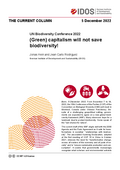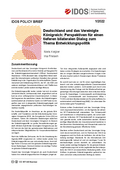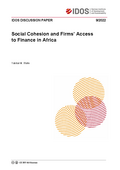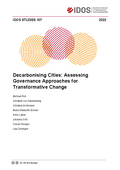-

Publications
Photo: www.shutterstock.com/de/image-photo/pont-du-gard-old-roman-aqueduct-45688924
Publications
The German Institute of Development and Sustainability (IDOS) publishes four independent publication series. IDOS researchers publish their current research results in Discussion Papers, Policy Briefs and Studies. Visiting scholars and cooperation partners also have the opportunity to publish their research results in one of the IDOS series. Publications from the series Analysen und Stellungnahmen, Briefing Paper and Two-Pager / Zweiseiter, which will be discontinued in 2022, will continue to be available online. The fourth publication series is for opinion pieces: The Current Column regularly comments on the latest developments and issues in international development policy.
IDOS researchers also regularly publish their research results in peer-reviewed and non-peer-reviewed German and international journals and publication series of other research institutes and institutions as well as with renowned book publishers. In addition, they use blogs and online platforms of partner institutions to communicate the Institute's research and advisory activities to an interested public.
Found 9409 results in 8 milliseconds. Displaying results 3131 to 3140 of 9409.
-
Diversity and implications of food safety and quality standards in Thailand and India
-
Revamping the OECD’s Five Rural Worlds model for poverty-oriented inter-sectoral analysis, communication and planning
-
Kooperation mit Afrika – ein strategisches Thema der Kanzlerin!
-
Holzenergie im Subsahara-Afrika: Nachhaltigkeit für eine Schattenwirtschaft
-
Do we need to re-think free trade?
-
Wie kann Entwicklungszusammenarbeit SDG-sensitiv ausgestaltet werden?
-
The impact of cash transfers on food security in sub-Saharan Africa: evidence, design and implementation
-
Baut Städte statt Lager: Uganda als Beispiel einer integrativen Flüchtlingspolitik
-
The UN Summit for Refugees and Migrants: more than just heart-warming words?
-
The missing link: values and the effectiveness of international democracy promotion















